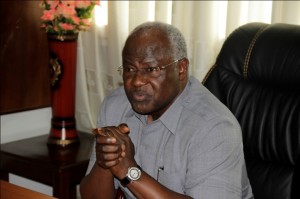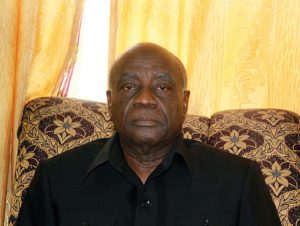
Agriculture, Energy, Infrastructure, Health and Social Services – which he hopes to focus on within his three years stated time. The president is almost completing his five years in office by September 17th 2012, and our press house has decided to review those promises, achievements and challenges in all government ministries and departments starting with the ministry of information and communications.
The Ministry of Information and Communication is an important ministry to the president’s Agenda for Change, its deals with government information services and propagate government policies for effective implementation.

The ministry was to vigorously pursue the national Communication Strategy Project, using Information and Communication Technologies (ICTs) as a means of disseminating government information as well as enhancing access to relevant information to all media practitioners and the general public through funding from the United Nations Development Programme (UNDP).
Four Media Resource Centres were to be established in Freetown, Makeni, Bo and Kenema, aimed at provide easy access to information to the populace. This is yet to be achieving even though the process has begun with the installation of Very Small Aperture Terminals (VSAT).
While launching mobile telecommunication service in the Tonkolili district northern Sierra Leone, four years ago, the Minister of Information and Communications Alhaji Ibrahim Ben Kargbo pointed out that the private sector, government and the National Telecommunications Commission must all play key role in enhancing the communication strategy for the growth of the nation. He informed the people of Mabonto that his government has gone a long way in landing the fibber optic cable which will ensure easy access to communication facilities.
‘’Landing of the submarine cable will not only make communications cheaper and affordable, it will have a special impact on the people of Sierra Leone’’ I have signed a loan agreement with the Islamic Development Bank to develop the ECOWAS (Economic Community of West African States) regional backbone infrastructure and e-governance project ECOWAN, set to cost $28 million within the next three years’’ said by the president Koroma while launching the Fiber landing site in Freetown.
Government successfully conducted a survey in 2012 in 13 Ministries Departments and Agencies to ascertain the readiness of Civil Servants, the extent of ICT usage as well as the current infrastructure in use. The project also catered for the upgrade of the Local Area Network (LAN) of the Ministry of information and Communications with servers, cisco switches, wireless routers, UPS etc. serving as a pilot phase.
Information minister IB Kargbo in one of his numerous statements said his Ministry has installed VSATs in Freetown, Bo, Kenema and Makeni to provide internet connectivity to the regional offices but the fact of the matter is that all government ministries and departments in those places heavily relied on public or individual internet services.
The E-Government Project was partially implemented to enhance tele-medicine or e-medicine component at the Connaught hospital in Freetown. The tele-medicine component was intended to provide health service delivery using ICTs in various fields to medical practitioners and citizens by Indian Medical experts. This project was put under the Pan-African e-Network Project.
But much has not been achieved in that direction, it is crystal clear that the system is not effectively functioning at the moment since the Indians departed from Sierra Leone.
Deputy Director of Communications at State House, Jarrah Kawusu-Konte said the national tele Communications Commission NATCOM, has granted licenses of varying degrees, including 3G, to more than four operators to deliver services in GSM and CDMA technologies.
There are major challenges the Ministry is grappling with at the moment in the implementation of these projects even when the lifespans of this current administration come to an end.
In March 2010 government created the West Africa Regional Communication Infrastructural Project (WARCIP) for the submarine fibber optic cable and negotiated the financing terms and conditions of the WARCIP project with the international Development Association (IDA), and the Credit were formally approved by the IDA board. The ACE Submarine Cable System will span over 17,000 Km and provide access to more than 23 countries including Sierra Leone, with a planned capacity of 1.9 Terabit per second.
The strategic objective of the ECOWAN project is to provide the capability to establish a common platform where exchange of information can be executed seamlessly to enhance productivity, expand opportunities for knowledge sharing and also promote regional integration.
According to the Minister of Information, the national Terrestrial Backbone- Huawei Project is meant to link capital cities of Guinea and Liberia with Freetown and provide services and applications for cities and towns along the routes in the country. It will provide services to Bo, Kenema, Port Loko, Kambia and Freetown.
‘’Plans are afoot to provide fibber optic ring topology and connect most of the cities and towns with high speed voice and data trunk routes, including Makeni, Magburuka, Koidu, Segbewema, Kailahun and mining companies such as Koidu Holdings, London Mining Limited, African Minerals Limited and Sierra Rutile Limited,’’ .
Pan-African e-Network Project is aimed at supporting three major components including the tele-medicine, tele-education and the VVIP connectivity.
Minister Kargbo has promulgated the Freedom of Information Bill (FOI) in parliament in support of the governance reforms to the free flow of information but the FOI Bill still lingers in parliament despite frantic efforts by civil society and the media to fast-track the process.
The State owned Sierra Leone Broadcasting Service SLBS was said to have been transformed to a public Corporation thereby allowing equal access to the radio and television by all citizens but government sentimental attachment to the institution is still visible which depict the purposes for it establishment.


Be the first to comment